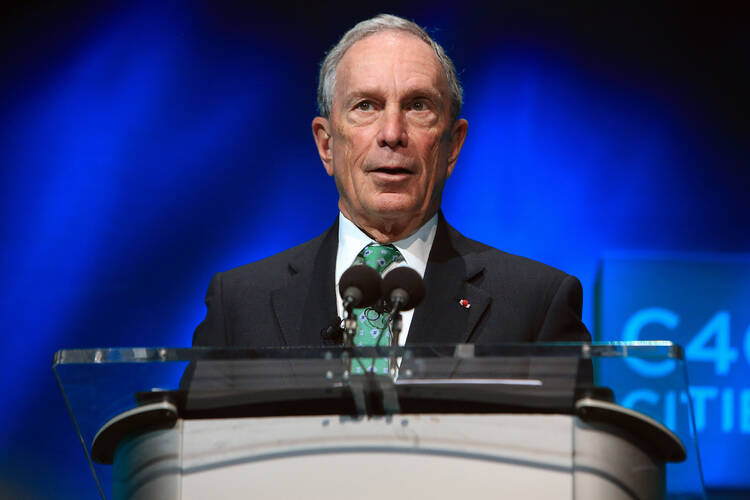Two rich New Yorkers with weak relationships to the two major political parties have been threatening to run for president for at least the past decade.
One of them, former New York mayor Michael Bloomberg, announced on Monday that he will not run as an independent this November. The other, real estate developer Donald Trump, surprised many last summer by abandoning his nonpartisan persona and deciding to compete against what turned out to be 16 elected officials for the Republican nomination. He is now the clear leader for the nomination, and his image as someone unrestrained by either party hasn’t suffered for it. Mr. Trump has been helped by debate rules that gave him, as the leader in national polls, a center-stage podium every time he deigned to appear with Ted Cruz, Marco Rubio, John Kasich and the rest, but it is still a genuine achievement that he’s essentially run as an independent within the Republican Party.
Mr. Bloomberg may be kicking himself for not trying the same gambit, presumably on the Democratic side—especially since the chief opponent of Hillary Clinton turned out to be Sen. Bernie Sanders, who has always run outside the two-party system until now and this week won the Michigan primary, thanks to independent voters. Instead, Mr. Bloomberg gave up his presidential dreams after commissioning a lot of research into how he would fare running against both Mr. Trump and the Democratic nominee in November. Politico’s Edward-Isaac Dovere writes, “the numbers weren’t adding up…. [Mr. Bloomberg] concluded that he’d lose on Election Day—or lose later in the House of Representatives. Either way, he decided, it would probably put Donald Trump in the Oval Office.”
The Bloomberg near-campaign conducted polling in 22 states, according to The New York Times, and Mr. Bloomberg concluded that the risk was too great that he would draw votes away from the presumed Democratic nominee, Mrs. Clinton, and inadvertently allow Mr. Trump to win the election with a plurality. Even if Mr. Bloomberg could carry a few states, the best-case scenario would be that no one wins a majority of electoral votes—in which case the House of Representatives would choose the winner, with each state’s delegation casting one vote. Since Republicans control most of the state delegations, that would probably also mean a victory for Mr. Trump.
Mr. Bloomberg may not have been the perfect third-party candidate, but he had the finances to get on the ballot in all 50 states and to be competitive with the two major parties in terms of advertising and fielding an organization. If he concluded that winning outside of the two-party system was impossible for him, it is hard to imagine who could break the duopoly. In 1992, independent Ross Perot made a strong effort, getting into the televised debates and at one point leading in the polls before finishing third with 19 percent of the vote and zero electoral votes.
The de facto ban on presidents who don’t come from the Democratic or Republican parties is just another feature of our political system that we never really chose; it came about in part because many of the country’s founders naively hoped that political parties wouldn’t exist at all and so didn’t consider how to govern them. One of the supposed saving graces of the two-party system is that it prevents extremists and demagogues from reaching the White House, requiring winners to assemble broad majorities both within their parties and in the general electorate. (Still, the winners in seven of the past 25 general elections have received less than half the vote.) Mr. Trump is testing that notion. He’s on his way to securing one of the two viable slots on the ballot this November even while ignoring standards of civility and seeming to issue threats against one of the top-ranking members of his adopted party. Referring to House Speaker Paul Ryan, Mr. Trump recently said, “I don’t know him well, but I’m sure I’m going to get along great with him and if I don’t, he’s going to have to pay a big price, O.K.?”
Independent candidates often claim they can win by bringing new voters into the election process. Mr. Trump hasn’t waited until the fall to do that, if the increased turnout in this year’s Republican primaries are any indication. In the Virginia primary, Marco Rubio won more than twice as many votes as Mitt Romney did when he easily beat Ron Paul in the 2012 primary, but that wasn’t enough to overtake Mr. Trump. In many western counties of that state, Mr. Trump easily doubled and trebled the 2008 vote for Mike Huckabee, whose social conservatism and populist rhetoric were once seen as a perfect fit for the region.
Many Republicans, including the party’s past three presidential nominees, have expressed their displeasure with Mr. Trump, but they may be impotent to stop his candidacy, in part because of “winner take most” primaries and other rules that were designed to speed up the nomination process. Mr. Bloomberg, best known outside of New York for advocating gun control and smaller soda sizes, would probably not be their ideal as an alternative in November anyway; still, his decision not to run underscores how difficult it would be for anyone to get onstage next to Mr. Trump and Ms. Clinton if they are the major-party nominees.
Though current polls give Ms. Clinton an edge over Mr. Trump, there remains the possibility that a downturn in the economy, an international crisis or mere fatigue after eight years of a Democrat in the White House will lead to a Republican win in November. Barring a once-in-a-century split in the Republican Party, comparable to Teddy Roosevelt setting up his own convention and platform after losing the GOP nomination in 1912, the strict two-party system will become Mr. Trump’s friend in the fall.
Also see “The South Rises Again in 2016 Primaries.








